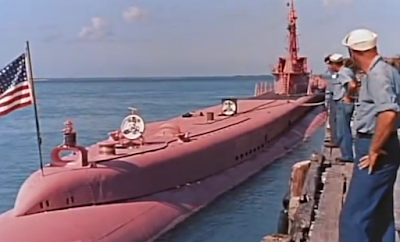I was eight years old the first time I saw The Thing from Another World (1951, directed by Christian Nyby). It played in the middle of a Saturday afternoon block of science fiction films on an independent TV station out of Denver. If memory serves (unreliable at this distance in my life), it was sandwiched between The Neanderthal Man and Tarantula. For all of Tarantula's virtues, The Thing was very much the cream of this crop. I knew its quality even then, and it's a film that rewards an adult viewer maybe even more than a monster kid. When I was talking about the film last year with a friend, we both were struck by the idea that all of the characters seemed to have a purpose in the film with their own motivations and inner lives. I went further by suggesting that, unlike the characters in many science fiction films, the characters in The Thing seem particularly adult to me. I take that to be the influence of Howard Hawks and Charles Lederer (and the unbilled Ben Hecht). This is a grim world of men--aviators and scientists--tasked with doing a job. Like Hawks's own films as a director, it's a film that builds communities in its shot compositions and compresses the dialogue in overlapping salvos that make its characters seem world weary and sly at the same time. The other thing that eight year old me noticed was that the monster wasn't so great. It seemed then and seems now to be a Frankenstein rip-off and not a particularly good one. It doesn't help that that's not the monster one finds in the film's source text, nor the one in the film's various remakes. That's why its star has dimmed over the years. Possibly, that's why it has been all but eclipsed by the 1982 remake. In common with the 1982 film, though, it is a portrait of its time etched in microcosm.
"The fool, the meddling idiot! As though her ape's brain
could contain the secrets of the Krell!"
Made by a human being. AI is the death of culture.
Pages
Tuesday, September 26, 2023
Friday, September 01, 2023
The Grant Mystique: Operation Petticoat (1959)
If you were to name Cary Grant's most influential movies, you might name films like North by Northwest, Bringing Up Baby, His Girl Friday, or The Philadelphia Story, which are all bona fide Hollywood classics. You might not get around to Operation Petticoat (1959, directed by Blake Edwards), and you would be wrong to omit it. In its way, it is among the most influential of all of Grant's films, and not just because it was Grant's biggest box-office hit (spoiler: it was). My own relationship with the film might be instructive. I originally saw the film when I was a kid. I saw it on television with my dad on a Saturday afternoon. It was very much a "dad" kind of movie: a comedy about the experiences of a military unit in the war. This was familiar territory because service comedies were a staple of the television of my youth. Hogan's Heroes, McHale's Navy, Gomer Pyle, F-Troop, M*A*S*H, all of these were everywhere back then, playing endlessly in the vampiric half-life of syndication. All of them trace a lineage to Operation Petticoat, either directly or in passing. Because, as I've said, Operation Petticoat was an absolutely gigantic hit. Hollywood follows the money. The downside of its influence is that Operation Petticoat sometimes feels like a TV sitcom. Many of its supporting actors--particularly Dick Sargent and Gavin McLeod--went on to long television careers. The film begat a TV spinoff in 1977 unto itself, which I may have seen before I saw the film proper (this happened with M*A*S*H, too). Its director, Blake Edwards, was at that time primarily known as a television writer and director, whose work on Peter Gunn was contemporary with Operation Petticoat. Operation Petticoat would launch him into the big time, and his films over the next decade would include the Pink Panther movies, Breakfast at Tiffanys, Days of Wine and Roses, and Experiment in Terror, among others. For all that, the presence of Cary Grant and, to a lesser extent, Tony Curtis removes the film from being merely an elaborate TV sitcom. The film persona of Cary Grant guarantees this. Grant was well rewarded for his service here, too. The film netted him three million 1959 dollars, which is about thirty-one million in 2023 dollars. It's not for nothing that Grant was among the wealthiest movie stars who ever lived.
The film itself? It has its pleasures.

